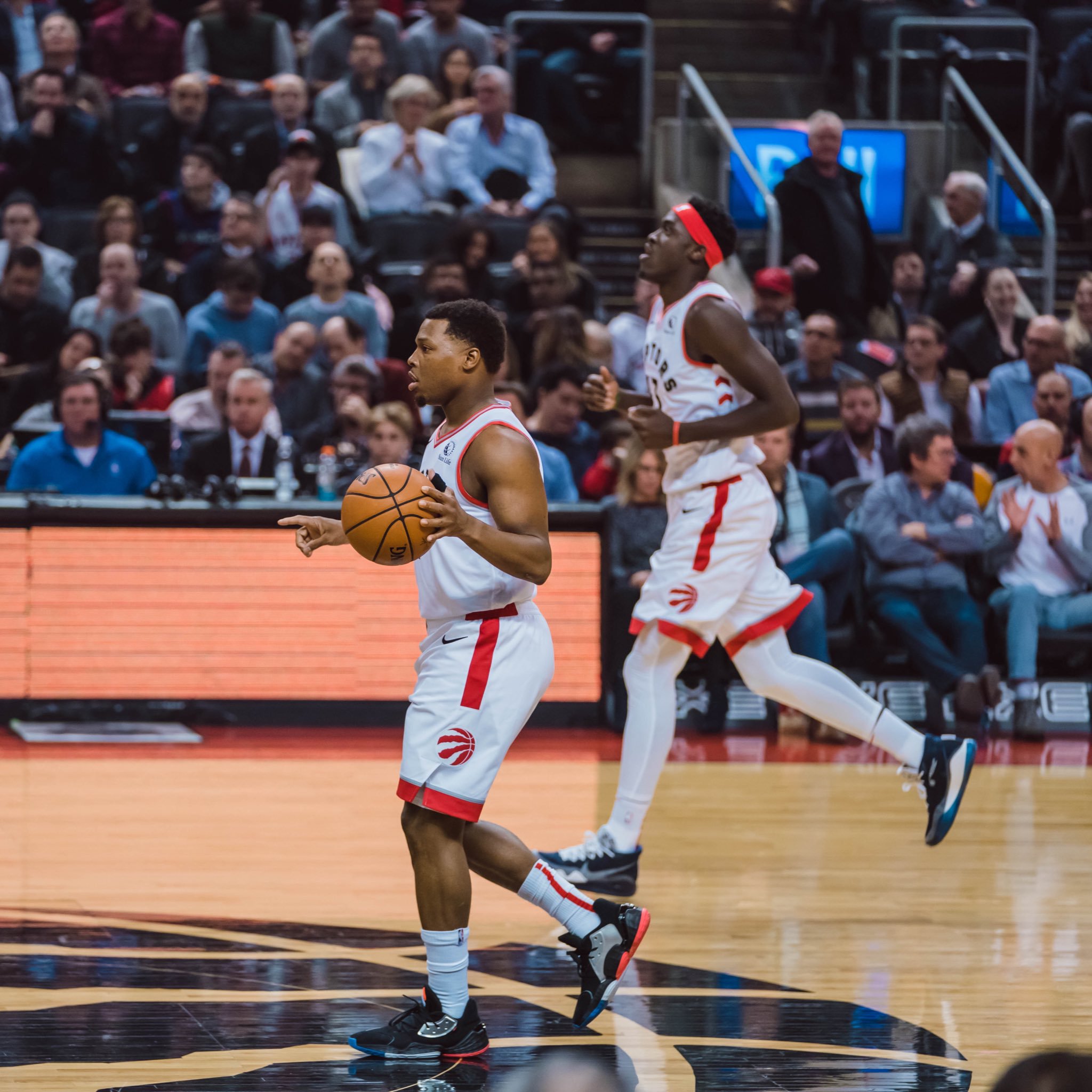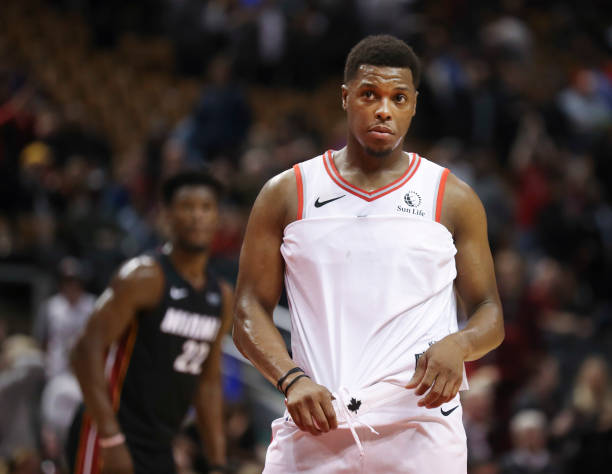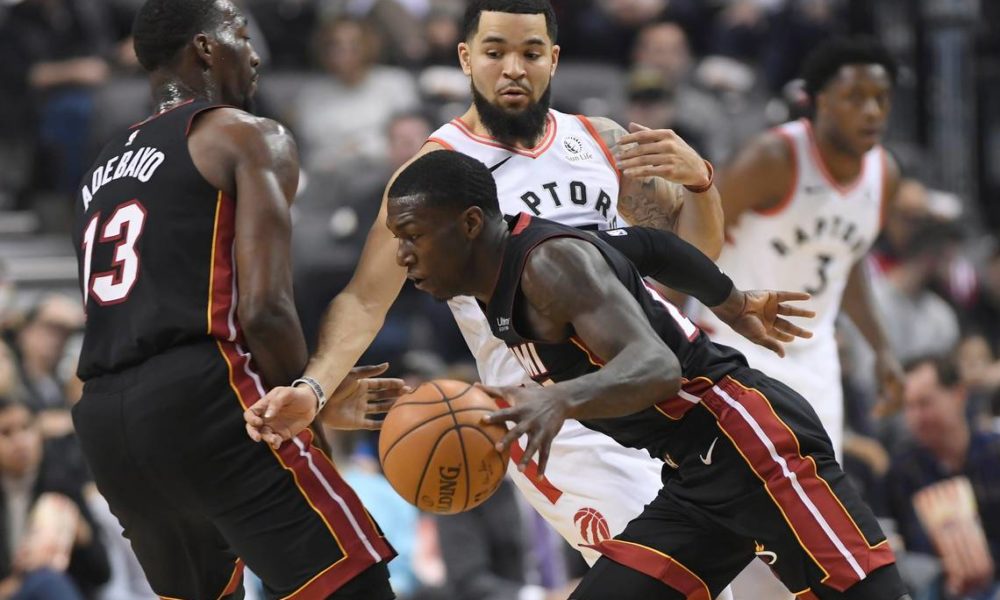There are several necessary ingredients if the Toronto Raptors are going to lose a game of basketball.
The first and most important element in beating the Raptors is a defender who can frustrate Pascal Siakam in isolation. There aren’t many in the game. Siakam’s defender has to be as big as Siakam — preferably bigger — and strong enough that Siakam can’t move him in the post. He has to be long enough to contest jumpers from all angles. He has to have terrific horizontal foot-speed so as to be able to guard Siakam on the perimeter while still staying up on his shot. Finally, he has to have a center of gravity low enough that he won’t be knocked off balance by Siakam’s spin moves. Basically, he has to be one of the most athletic bigs in the game.
That’s a long list of requirements. There’s maybe five guys in the NBA who fulfill each of those categories. We’ve seen Anthony Davis, Jonathan Isaac, and Giannis Antetokounmpo all capably defend Siakam in games this year. Now, we’ve seen Bam Adebayo of the Miami Heat do the same. Behind Adebayo’s defense, the Heat topped Toronto 121-110 in overtime.
Adebayo guarded Siakam brilliantly. Siakam shot 5-of-14 from the floor for 15 points, and he ceded primary and even secondary initiating duties of the offense to Kyle Lowry and Fred VanVleet. Adebayo is so big that Siakam can’t move him in the post. Adebayo absorbs that contact without moving backwards, and Siakam was the one who lost momentum in his drives. Adebayo stayed in front of Siakam, who seemed to have no north-south burst in the half-court. It’s not just that Siakam couldn’t drive by Adebayo; it’s more that he rarely even tried.
“I don’t think I was aggressive enough,” said Siakam after the game. “I think I’ve got to understand I’ve got to be in attack mode all the time. That’s who I am.”
There were occasional fixes, or at least patch-jobs. Toronto countered the Adebayo problem in the third quarter by going massive. The Raptors gambled that with two centers on the floor in Serge Ibaka and Marc Gasol, the Heat would have to shift Adebayo onto a larger player. When Adebayo moved to Ibaka, Siakam went to work on Jimmy Butler in the post, overpowering him for some easy layups to get himself going. There are workarounds, always, in the NBA game, for a tactical disadvantage. Toronto found one, but it took until late in the game when they were already trailing by double-digits. That combination finished +1 in 2.1 minutes of action, but it wasn’t viable over a long stretch because of Miami’s shooting. No matter how Toronto approached it, Adebayo’s ability to defend Siakam alone gave Miami a huge edge.
“Pascal couldn’t get around him, couldn’t get over the top of him very well either,” said Nick Nurse after the game.
Being able to defend Siakam isn’t the only thing an opponent needs to beat the Raptors. A team looking to top the champs needs a star who consistently forces double-teams and rotations. Jimmy Butler offers that in spades. He is a brilliant offensive player, capable in almost every situation, and as Toronto learned in the playoffs last May, Butler is happy to fill the shoes of the adult in the room. OG Anunoby is a fantastic defender, and he did a great job against Butler. (Sidebar: a much more detailed piece about Anunoby’s defense, including against Butler, is in the works.) But Butler’s very presence on the floor necessitated traps, blitzes, high double-teams, and altogether funky defenses to keep Butler guessing. At times, it worked. But at times, it opened up holes on the weak-side, offering Miami’s role players open shots. Meyers Leonard shot two-of-three from deep. Duncan Robinson, the hero of the game for the heat, shot six-of-nine.
“They were making really good reads,” said Nurse. “We were maybe a half-step slow, as well, and we didn’t quite get out to shooters. It’s a couple-pass scenario, that we’ve got to protect the rim and then get out to the shooters. We didn’t have the greatest energy, I didn’t think, especially in the first half.”
Because the Raptors were having so much trouble scoring with Siakam struggling, they opted to close with Norman Powell over Anunoby. Nurse explained after the game he made the choice for the shooting upgrade. Powell delivered, finishing 4-of-8 from deep, but Butler exploded without Anunoby to check him. Butler scored the first eight points of overtime, and he finished with a monstrous 22 points, 13 rebounds, and 12 assists. The Raptors had to choose between stymieing Butler and keeping his shooters off the board. They could only choose one. In the first half, Butler was quiet, but Miami’s shooters dominated. In the second half and overtime, Butler thrived.
That’s the other important element for a team to beat Toronto; they need their supporting cast to shoot the lights out when required. Miami shot 15-of-38 from deep, good for 39.5 percent. Toronto, the best shooting team in the league entering the game, finished at 25.6 percent, connecting on 11-of-43 triple attempts. Kyle Lowry alone, in his return from injury, was 0-for-11. The Raptors couldn’t find other ways to score, such as in transition.
There are supposed to be positive offensive results to Toronto’s aggressive brand of defense against star scorers. The Raptors forced a few live-ball turnovers, but they didn’t amount to many actual points. The Heat were hyper-aware of the Raptors’ strengths. Miami’s transition defense was stellar, always closing gaps in the lane, forcing shooters off the line, and making Toronto choose secondary options on the break. There were almost no easy layups, and that should be impossible against a team that looks to run as much as Toronto. Credit there to Erik Spoelstra for the plan and especially to the Heat for execution. Toronto finished shooting five-of-15 in transition. That Toronto couldn’t capitalize on turnovers was a huge hinge upon which this game turned.
That Toronto even had a chance in this game was a minor miracle. Siakam played in his own head, not only missing shots, but even turning down good looks and forcing up bad ones. Not to pick on Siakam, as he’s been unimpeachable to start the season, but he struggled against Miami’s defense. Lowry and Ibaka were both shaking off rust, and Lowry didn’t make a field goal until midway through the fourth quarter. Duncan Robinson, not to be repetitive, made six triples. Six. That alone ought to mean a victory.
In the end, the Raptors grifted their way to overtime. Lowry played with desperate energy on the offensive end, driving, collecting his own rebounds, and altogether forcing shooting fouls and stealing points from the free throw line. He finished eight-of-eight from the line on a night when he doubted his jumper from any further distance. Even if his shot was off, he was brilliant on the defensive end, switching, stripping Heat players of the ball on drives, taking charges, blocking out centers, and doing all the gritty work. Lowry remains Lowry, and his presence on the floor was a positive. For the Raptors to even be close to a win, Powell had to be heroic, hitting mirror-image triples from the corners to give the Raptors a lead in the final minute. Serge Ibaka was great on both ends.
But in the end, Miami erased Pascal Siakam, found consistent sources of efficient shots, bottled up Toronto’s transition attack, and had their supporting cast shoot well from deep. Toronto shot poorly and, some impressive moments from Anunoby and Lowry aside, defended worse. It took a number of unlikely elements to beat the Raptors. It’s unlikely we’ll see so many elements going against Toronto in the future. The Miami Heat may have written a blueprint for beating the Raptors, but it remains to be seen if anyone else will have the requisite ingredients to follow the instructions.



